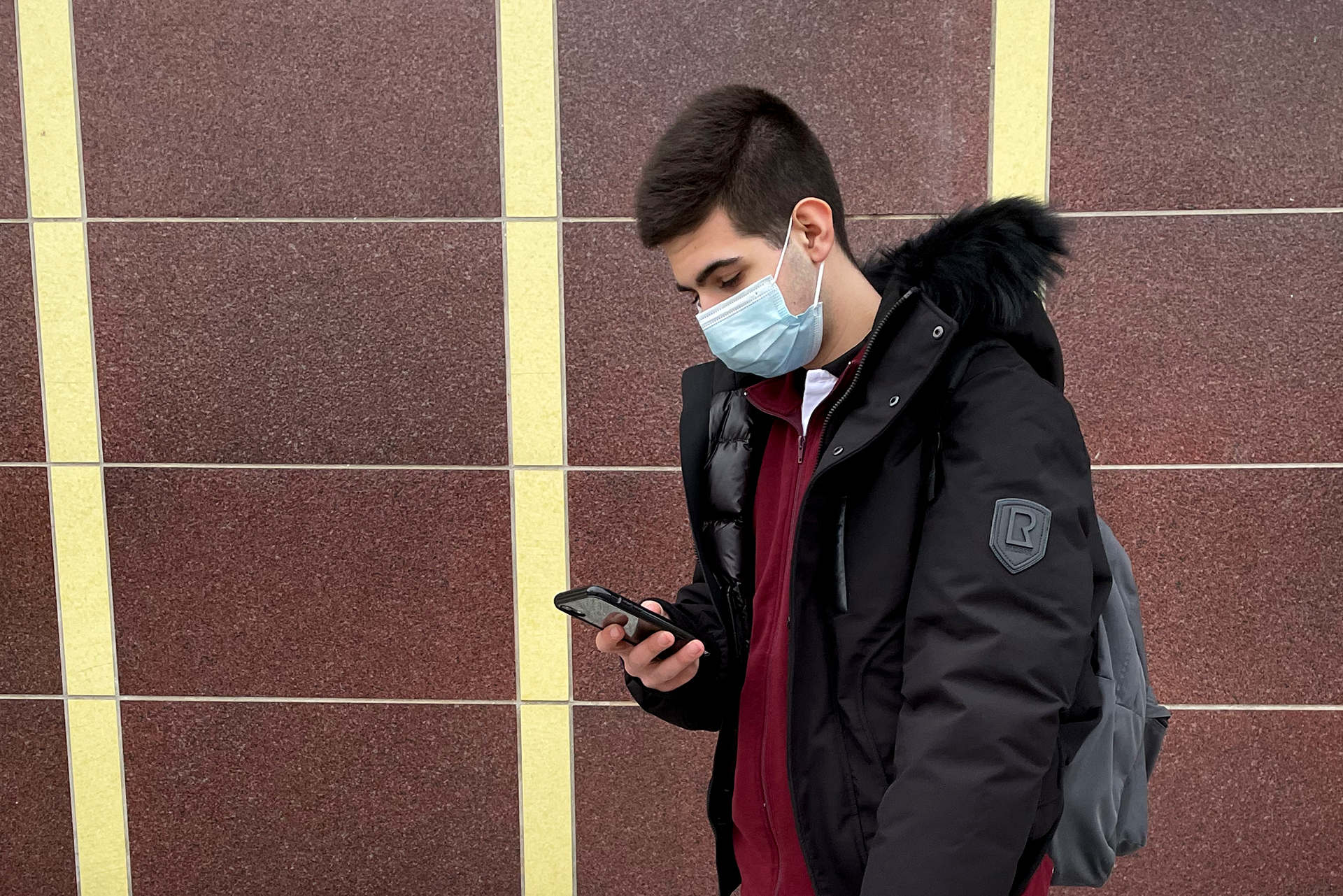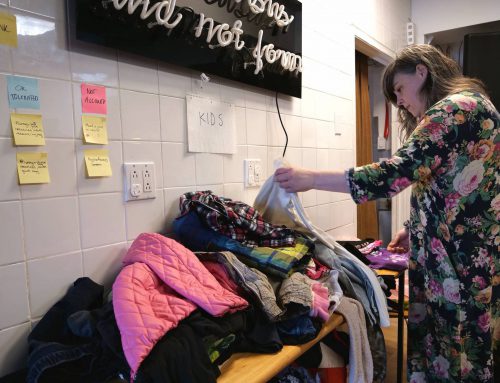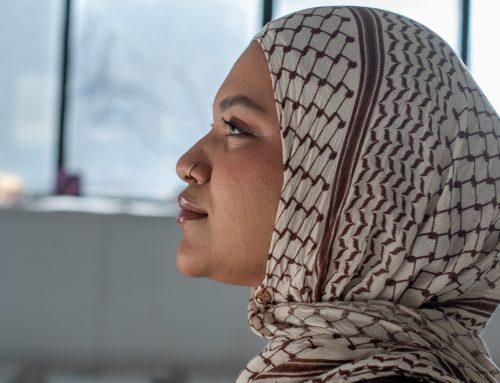BY Maria Bouabdo & Narmeen Imam
“I wasn’t excited to go back and learn, but I really like to talk and be with my friends,” Dennis Klapsis says.
Klapsis is a secondary three student at LaurenHill Academy in Saint-Laurent. He calls himself a “social animal.” He explains he’s always talking to people in school, interactions that just aren’t the same online. The 15-year-old said if he had to choose between in-person and online school, he would choose to go in-person.
“It’s really good for us to go out, back to school and speak to people, have real social and human interactions and just talk to people,” the 15-year-old says. “At school, I feel like I could really be with my friends and talk and do fun stuff, walk around the school… play basketball with my friends.”
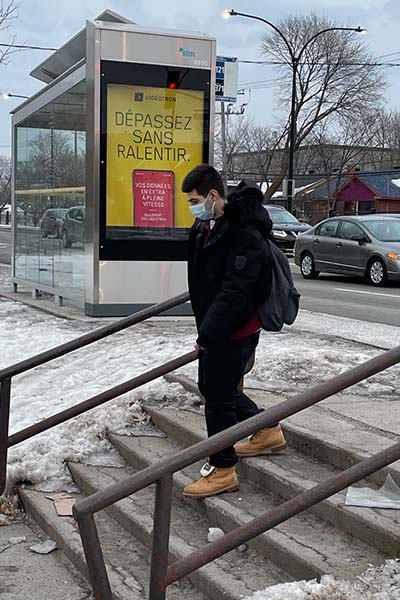
Dennis Klapsis on his way to school. Photo by Maria Bouabdo.
According to an American study of 3,300 teenagers, 30 per cent have been feeling more unhappy or depressed and 29 per cent don’t feel connected to their classmates, teachers, and community, after schools shut down.
Emily Dakkak works as a high school social educator with Ensemble pour le respect de la diversité. She says that online school has both advantages and disadvantages.
“It’s hard because it’s kind of a double-edged sword where there are issues on both ends,” Dakkak said. “For example, if a kid is being bullied, it might be nice for them to have a break from that and to be at home. But then, for a kid who thrives in the social environment, and who needs that to succeed, it’s going to be hard for them to stay home.”
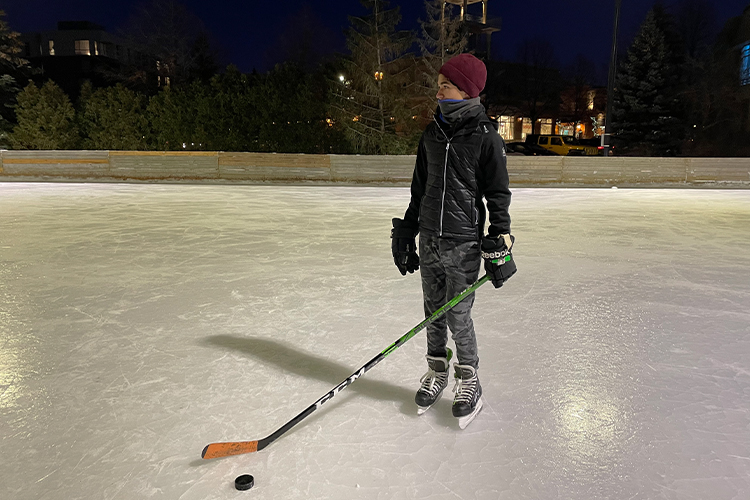
Alex Papadopoulos playing hockey alone at an ice rink nearby his house in Saint-Laurent. Photo by Narmeen Imam.
Online school also has a long-term impact on children and teenagers’ lives.
Dr. Michael Bukowski, a professor in the Psychology Department at Concordia University, says there are older studies suggesting that the best way to predict who will have trouble adjusting in adulthood is to look at aspects of children’s interactions with their peers.
“So in that respect, I think that experiences with peers are really fundamental,” he says. “And I think that it sets the stage for later development. I don’t mean to suggest that experiences with the family don’t matter. But certainly, I believe that experiences with peers are very important.”
One of the most visible impacts of the pandemic on children and teenagers has been the on-and-off restrictions related to organized sports. For youths who participate in such sports and use them as coping mechanisms, these restrictions have taken a toll on their mental health. Video by Narmeen Imam.
These peer relations are even more significant in younger children, especially in pre-adolescence, when several aspects of children’s development occur. They might have more freedom to choose their friends at that age, for example.
“Children are maybe developing some clear sense of what they’re good at, what they’re not good at,” Bukowski says. “They’re developing a stronger sort of set of predilections in terms of what they might want to do with themselves.”
Although children and teenagers don’t get all the face-to-face interactions they need when doing remote learning, they are still interacting with their peers virtually, which is important, especially for pre-adolescents.
“They learn how to take other people’s perspectives; they pick up a lot of information about how one can go about getting along with others, simply by interacting with their peers,” Bukowski says.
He adds that peer relations are also a chance for validation, such as knowing to what extent their friends seem to like them because of certain characteristics.
“It’s an opportunity to derive some of the provisions of friendship, security, trust, intimacy,” Bukowski says. “These are possible via internet and so forth. But I think that a lot of these skills, or experiences, are more likely to happen in person.”
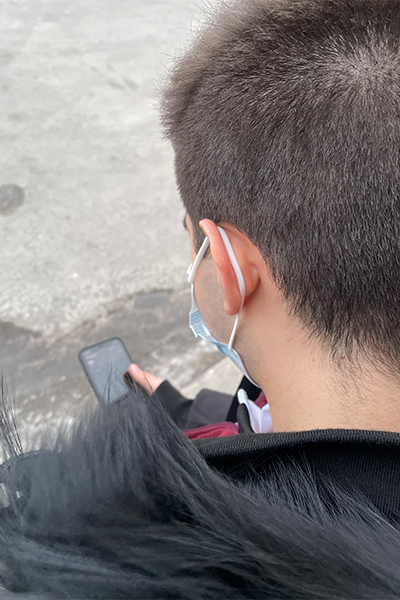
Klapsis scrolling on Instagram in front of LaurenHill Academy on Feb. 16. Photo by Maria Bouabdo.
Bukowski says that the best students do well regardless of the method of learning, while average students might not do as well, and weaker students might struggle a lot.
Klapsis notes that some of his teachers would have tutorials in-person, where students would be able to ask questions during lunch hour or at the end of the day. But not all teachers hold these tutorials online, making it more difficult to ask for help for certain classes. According to Bukowski,this would mostly affect weaker students.
“For children who are assertive, who have good social skills, who have good telephone skills, who have good online skills, it’s not going to be so bad,” Bukowski says. “But for kids who are anxious, for kids who have trouble forming relationships, I think that the online context will be more difficult.”
He adds that some of the demands of social relations, such as understanding facial expressions or being able to figure out what’s going on in a certain situation quickly, are more difficult to learn online.
Dakkak notes that the pandemic’s effect on youth goes beyond relationships with their peers. She says the uncertainty of never knowing what will happen might make young people lose their trust in adults.
Timeline of school reopenings and closures in Quebec. Media by Maria Bouabdo.
She also thinks that the lack of stability that’s caused by going back and forth between in-person and online learning plays a big part in how children will fit in society later on, since it’s important for them to have a structure, such as the one offered in school.
“When you’re at home, you don’t have a structure,” Dakkak says. “You can go eat whenever you want, you can do your class laying in your bed, there are no rules. And I think in society, in the future, they might have a little bit of trouble. Because we do have rules in society to function. And if you don’t have rules for a long period of time, you might kind of get accustomed to that and have a hard time following rules … once you graduate high school.”
An international study of 15 to 24-year-olds found that this age group was up to 80 per cent more likely to report symptoms of anxiety depression than adults.
School closures contribute to the disruption of daily routines and social interactions, which help maintain good mental health.
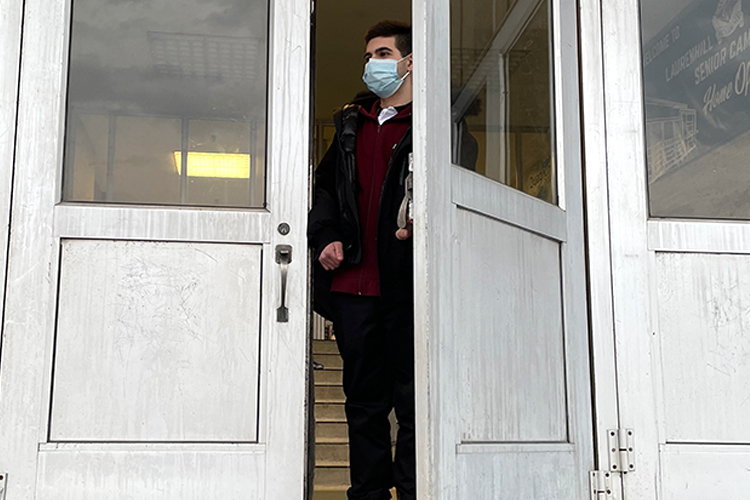
Dennis Klapsis leaving school. Photo by Maria Bouabdo.
Klapsis says he was looking forward to going back to school after weeks of online school during the Omicron wave of the pandemic. But not everyone was. He says one of his friends was feeling stressed and anxious about in-person school again.
It is not uncommon to see people get anxious about the possibility of going back to in-person activities after a period of online learning. Dakkak says she has seen some students struggle with that.
She says it is different when teenagers are apart from their peers, but some students get used to it, which can cause them to be anxious when it’s time to go back to school.
